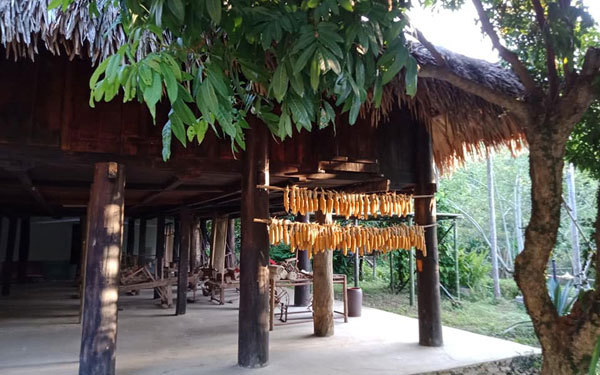 |
| Painter Vu Duc Hieu at the Muong Cultural Space in Hoa Binh Province. |
He granted an interview on Nhan Dan (People) Newspaper to talk about the awards.
Why has the Muong Cultural Space Museum been honoured with a cultural award from such a distant place?
In mid-2018, I went to the Republic of Korea (RoK) and visited Jeonju City, the capital of the southwestern province of Jeollabuk-do. In addition to high buildings, there are ancient villages with traditional “hanok” houses which are over 500 years old that are still being preserved. They are valuable heritages that have been attractive for tourists to Jeonju. Therefore, the city’s mayor, along with local leaders, founded the “Jeonju International Awards for Promoting Intangible Cultural Heritage” (JIAPICH), aiming to honour individuals and organisations on protecting and promoting intangible cultural heritages around the world. In accordance with the criteria and rules, JIAPICH will be presented to individuals, local communities, coordinators, non-government organisations and other organisations in practicing the development of models, social solidarity and cooperation in cultural activities while enhancing the pride of community-based culture in the models of protecting cultural heritages from regardless of nationality, ethnicity, religion, or race. The ultimate effect is the value that was gained in the process of preserving the ancient cultures and developing them in the contemporary life. The awards have been held for six years. The year 2020 witnessed the awards being granted in an online form for the first time.
Could you talk more about the awards’ value?
The JIAPICH was worth US$30,000 for annual award ceremony in September. In each ceremony, 1-5 individuals and cultural organisations around the world will be selected to receive the award. The organising board granted two air tickets for each individual and organisation to go to Jeonju City and stay there for 10 days.
What a pity! Due to Covid-19 epidemic, the RoK side will not invite the winners to attend the live awards ceremony.
However, after all, the awards’ value is not the money nor travel; it is difficult to gain the award when competing with hundreds of individuals and organisations around the world. From April to June, the organising board had to make a basic selection from the submissions; give final assessments; and verify and inform the winners. The jury board consisted of 11 cultural experts from many countries in five continents. They were praised by UNESCO for the activity.
In addition to the five parts of a dossier sent in April, the organising board will send officials to the cultural sites that passed the round of “final assessment”. They will evaluate how the cultural areas to operate.
Finally, after receiving the award, the cultural site will be considered as a “model in the protection and promotion of intangible cultural heritage” and widely propagated. The individuals, units and organisations in other localities can learn lessons from this model to apply them into another intangible cultural heritage which is “calling for help”. That is the profound value of the JIAPICH.
 |
| A corner of Muong Cultural Space. |
The museum has operated for 13 years. In addition to the gained successes, which difficulties will it face in the near future?
Regarding the museum’s successes, I want to give sincere thanks to reporters. Over the past 13 years, we have faced numerous ups and downs and the reporters have always closely followed the museum’s operations. We keep hundreds of articles in different types of print media, radio broadcast, television and documentary films and photos. Since 2017, I have been invited to many provinces around the country (such as Ninh Binh, Quang Nam and Phu Tho) as well as localities abroad (such as Quanzhou city in China) to take the role as an expert, introduce Muong culture in various festivals, and advise and reproduce the local cultural heritages.
However, the museum faces numerous difficulties. It is only about 7km from Hoa Binh City. However, the expansion of the road through to the museum has been completed yet, causing obstacles for visitors. In addition, the organisation of activities that combine the heritage with contemporary arts has been affected. NDO

Festival showcases Hoa Binh Province's traditional food and handicrafts
A food tray featuring the traditional dishes of Muong ethnic minority in Hoa Binh has been recognised as the biggest of its kind by the Vietnam Book of Records.